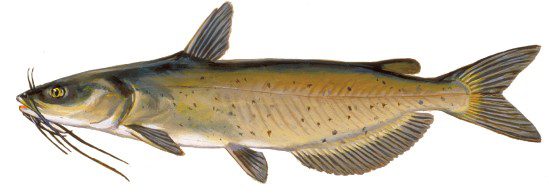

Catfish is a great source of healthy omega-3 fats, lean proteins, vitamins A and B12, calcium, and iron which all work together to keep dogs heart-healthy and promote their overall health. It is a good option for adding to a balanced diet for dogs.
Catfish is a great source of healthy omega-3 fatty acids which help keep dogs heart-healthy and prevent them from becoming obese. It is also a good source of lean proteins that help support a dog’s cell growth and repair. It is packed with essential nutrients like vitamin A, vitamin B12, calcium, and iron which can help strengthen the immune system and promote blood and bone health.
Catfish have a high tolerance for poorly oxygenated water, so be sure to source your catfish responsibly. Catfish bones are a choking hazard, so make sure to clean and debone the fillet thoroughly before giving to your dog. Raw catfish may contain harmful bacteria and parasites, so always make sure to cook the catfish fillet thoroughly.
Choose catfish that is responsibly sourced from clean water. Clean and debone the catfish and cook the fillet thoroughly without seasoning. Moderation is key when adding catfish to your dog’s diet, so give as an occasional treat.
Catfish is a freshwater fish most commonly found in ponds and streams. It's known by a few other names such as mudcat, hornpout, and goggle-eye. Depending on where it's found, catfish can either be found wild caught or farm raised. It has a wide range of usage from being a staple protein in various dishes to a popular game fish.
When it comes to feeding catfish to your dog, it can be beneficial in many senses. The healthy fats found in catfish provide your pup with essential Omega-3 fatty acids that can reduce unhealthy weight gain and also maintain the health of their heart. Not only that but catfish is an excellent source of proteins, vitamins A and B12, and iron. These nutrients are all necessary to promote your dog's cell growth, immune system, and bone health. However, when considering the risks, catfish are known to have a high tolerance for poorly oxygenated water which can potentially contain bacteria or parasites like salmonella and Listeria monocytogenes.
If you want to give your pup catfish, it's best to choose responsibly sourced ones that have not been caught from polluted waters. Clean and debone the catfish then cook it thoroughly without seasoning. You can serve it as an occasional treat in moderate portions. Alternatively, you could give your pup other fishes with similar health benefits, like salmon or tuna.
Many readers may wonder if this food is affordable and easy to access. The answer is yes. Catfish is widely available and rather affordable compared to other kinds of seafood.
Have you tried giving your pup catfish yet? We'd love to hear your and your pet's experience in the comment section below!
We’d like to remind our beloved pet owners out there to always keep an eye on their pets' health and nutrition intake. By providing your furry friend with natural foods like catfish, you're ensuring they get the most out of their meals. We here at [Company] wish you and your pet the very best.Catfish is a freshwater fish most commonly found in ponds and streams. It's known by a few other names such as mudcat, hornpout, and goggle-eye. Depending on where it's found, catfish can either be found wild caught or farm raised. It has a wide range of usage from being a staple protein in various dishes to a popular game fish.
When it comes to feeding catfish to your dog, it can be beneficial in many senses. The healthy fats found in catfish provide your pup with essential Omega-3 fatty acids that can reduce unhealthy weight gain and also maintain the health of their heart. Not only that but catfish is an excellent source of proteins, vitamins A and B12, and iron. These nutrients are all necessary to promote your dog's cell growth, immune system, and bone health. However, when considering the risks, catfish are known to have a high tolerance for poorly oxygenated water which can potentially contain bacteria or parasites like salmonella and Listeria monocytogenes.
If you want to give your pup catfish, it's best to choose responsibly sourced ones that have not been caught from polluted waters. Clean and debone the catfish then cook it thoroughly without seasoning. You can serve it as an occasional treat in moderate portions. Alternatively, you could give your pup other fishes with similar health benefits, like salmon or tuna.
Many readers may wonder if this food is affordable and easy to access. The answer is yes. Catfish is widely available and rather affordable compared to other kinds of seafood.
Have you tried giving your pup catfish yet? We'd love to hear your and your pet's experience in the comment section below!
We’d like to remind our beloved pet owners out there to always keep an eye on their pets' health and nutrition intake. By providing your furry friend with natural foods like catfish, you're ensuring they get the most out of their meals. We here at [Company] wish you and your pet the very best.